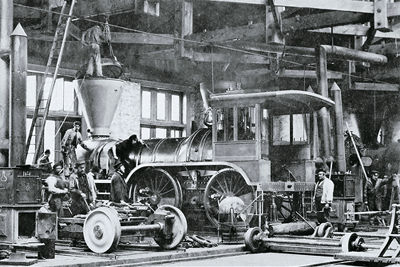Browse "Unions & Labour"
-
Article
Cape Breton Strikes 1920s
The CAPE BRETON labour wars of the early 1920s represented an intense local episode of class conflict similar to the WINNIPEG GENERAL STRIKE (1919).
"https://development.thecanadianencyclopedia.ca/images/tce_placeholder.jpg?v=e9dca980c9bdb3aa11e832e7ea94f5d9" // resources/views/front/categories/view.blade.php
https://development.thecanadianencyclopedia.ca/images/tce_placeholder.jpg?v=e9dca980c9bdb3aa11e832e7ea94f5d9
-
Article
Collective Bargaining
Collective bargaining is a method of jointly determining working conditions between one or more employers on one side and organized employees on the other.
"https://development.thecanadianencyclopedia.ca/images/tce_placeholder.jpg?v=e9dca980c9bdb3aa11e832e7ea94f5d9" // resources/views/front/categories/view.blade.php
https://development.thecanadianencyclopedia.ca/images/tce_placeholder.jpg?v=e9dca980c9bdb3aa11e832e7ea94f5d9
-
Article
Collectivism
As the social evils of industrialization and urbanization unfolded in the later 19th century, many Canadians saw the basic problem as an excess of individualism.
"https://d2ttikhf7xbzbs.cloudfront.net/media/media/abbfb032-ed66-462e-a59f-9f2a91759898.jpg" // resources/views/front/categories/view.blade.php
https://d2ttikhf7xbzbs.cloudfront.net/media/media/abbfb032-ed66-462e-a59f-9f2a91759898.jpg
-
Article
Confederation of Canadian Unions
Confederation of Canadian UnionsFounded in 1969 on the initiative of veteran labour organizers Kent ROWLEY and Madeleine PARENT, the Confederation of Canadian Unions (originally the Council of Canadian Unions 1969-73) is dedicated to the establishment of a democratic, independent Canadian labour movement free of the influence of American-based international unions. In 1994 the CCU contained approximately 20 000 members in 11 affiliated unions, in both the public and private sector. The CCU has been a...
"https://development.thecanadianencyclopedia.ca/images/tce_placeholder.jpg?v=e9dca980c9bdb3aa11e832e7ea94f5d9" // resources/views/front/categories/view.blade.php
https://development.thecanadianencyclopedia.ca/images/tce_placeholder.jpg?v=e9dca980c9bdb3aa11e832e7ea94f5d9
-
Article
Confederation of National Trade Unions
The Catholic unions were reorganized at the end of WWI, stressing protection of members' rights and interests as workers. Anxious to unite their forces, they jointly formed the Canadian Catholic Confederation of Labour in 1921 with about 17 600 members.
"https://d2ttikhf7xbzbs.cloudfront.net/media/media/aee50531-a98b-429d-b2c6-3dd787abde3f.jpg" // resources/views/front/categories/view.blade.php
https://d2ttikhf7xbzbs.cloudfront.net/media/media/aee50531-a98b-429d-b2c6-3dd787abde3f.jpg
-
Article
CUPW Postal Strikes
The Canadian Union of Postal Workers (CUPW) is a labour union that represents over 55,000 members across Canada (2024). Members of the CUPW include Canada Post employees as well as couriers, vehicle mechanics, and other workers in the private sector. (See also Postal System.) Since 1965 the CUPW (previously Canadian Postal Employees Association) has represented members in numerous strikes, walkouts and lockouts over several complex labour issues. (See also Strikes and Lockouts.)
"https://d2ttikhf7xbzbs.cloudfront.net/TCE_placeholder.png" // resources/views/front/categories/view.blade.php
https://d2ttikhf7xbzbs.cloudfront.net/TCE_placeholder.png
-
Macleans
General Motors Strike Settled
This article was originally published in Maclean’s magazine on October 28, 1996. Partner content is not updated. For picketing Canadian autoworkers, it was a symbolic gesture. With the strike against General Motors of Canada Ltd. dragging into its third week, tempers flared at a cavernous GM plant in Oshawa, Ont.
"https://development.thecanadianencyclopedia.ca/images/tce_placeholder.jpg?v=e9dca980c9bdb3aa11e832e7ea94f5d9" // resources/views/front/categories/view.blade.php
https://development.thecanadianencyclopedia.ca/images/tce_placeholder.jpg?v=e9dca980c9bdb3aa11e832e7ea94f5d9
-
Article
Industrialization in Canada
Industrialization is a process of economic and social change. It is one that shifts the centres of economic activity onto the focus of work, wages and incomes. These changes took two forms in Canada, beginning in the 19th century. First, economic and social activities were transformed from agriculture and natural resource extraction to manufacturing and services. Second, economic and social activities shifted from rural cottage industries to urban industrial pursuits. Industrialized production took place under the privately owned factory system, in which a larger proportion of the population expected to be wage earners for all of their working lives. Therefore, industrialization brought major changes, not only in work and the economy, but in the way society was organized and in the relations among different groups in society. Although it has evolved over nearly two centuries, the process of industrialization is considered revolutionary — as the term Industrial Revolution suggests — because it marked the shift from feudalism to capitalism, and from agriculture to manufacturing and services — changes that fundamentally altered human existence. This is the full-length entry about Industrialization in Canada. For a plain-language summary, please see Industrialization in Canada (Plain-Language Summary).
"https://d2ttikhf7xbzbs.cloudfront.net/media/media/e82643fb-76c4-461d-ba67-acf2e559c83a.jpg" // resources/views/front/categories/view.blade.php
https://d2ttikhf7xbzbs.cloudfront.net/media/media/e82643fb-76c4-461d-ba67-acf2e559c83a.jpg
-
Article
Labour Mediation
Labour mediation embraces a variety of processes for resolving disputes between employers and trade unions in the organized sector of the labour market.
"https://development.thecanadianencyclopedia.ca/images/tce_placeholder.jpg?v=e9dca980c9bdb3aa11e832e7ea94f5d9" // resources/views/front/categories/view.blade.php
https://development.thecanadianencyclopedia.ca/images/tce_placeholder.jpg?v=e9dca980c9bdb3aa11e832e7ea94f5d9
-
Article
National Farmers Union
The National Farmers Union, founded 1969, was a voluntary organization of farm families. The NFU is democratically structured to assure members full control at all levels.
"https://development.thecanadianencyclopedia.ca/images/tce_placeholder.jpg?v=e9dca980c9bdb3aa11e832e7ea94f5d9" // resources/views/front/categories/view.blade.php
https://development.thecanadianencyclopedia.ca/images/tce_placeholder.jpg?v=e9dca980c9bdb3aa11e832e7ea94f5d9
-
Article
Nine Hour Movement
The Nine Hour Movement was an international phenomenon, taking place in Canada between January and June 1872. The movement’s goal was to standardize shorter working days. Though this particular mandate was unsuccessful, the movement did have an impact, including setting the foundation for the Canadian Labor Union.
"https://d2ttikhf7xbzbs.cloudfront.net/media/media/74917b1f-8a36-49c3-99fd-4cf328a0bfa3.jpg" // resources/views/front/categories/view.blade.php
https://d2ttikhf7xbzbs.cloudfront.net/media/media/74917b1f-8a36-49c3-99fd-4cf328a0bfa3.jpg
-
Article
Oil, Chemical and Atomic Workers International Union v Imperial Oil Limited et al
In 1961 the BC Legislature prohibited trade unions from using membership fees paid under a collective agreement checkoff provision for political purposes.
"https://development.thecanadianencyclopedia.ca/images/tce_placeholder.jpg?v=e9dca980c9bdb3aa11e832e7ea94f5d9" // resources/views/front/categories/view.blade.php
https://development.thecanadianencyclopedia.ca/images/tce_placeholder.jpg?v=e9dca980c9bdb3aa11e832e7ea94f5d9
-
Article
On to Ottawa Trek and Regina Riot
In April 1935, about 1,500 residents of federal Unemployment Relief Camps in British Columbia went on strike. They travelled by train and truck to Vancouver to protest poor conditions in the Depression-era camps. After their months-long protest proved futile, they decided to take their fight to Ottawa. On 3 June, more than 1,000 strikers began travelling across the country, riding atop railcars. By the time they reached Regina, they were 2,000 strong. But they were stopped in Regina, where the strike leaders were arrested, resulting in the violent Regina Riot on 1 July 1935.
"https://d2ttikhf7xbzbs.cloudfront.net/media/media/296df678-f18c-47a4-91d9-02e0c8aad009.jpg" // resources/views/front/categories/view.blade.php
https://d2ttikhf7xbzbs.cloudfront.net/media/media/296df678-f18c-47a4-91d9-02e0c8aad009.jpg
-
Article
One Big Union
The One Big Union (OBU) was a radical labour union formed in Western Canada in 1919. It aimed to empower workers through mass organization along industrial lines. The OBU met fierce opposition from other parts of the labour movement, the federal government, employers and the press. Nevertheless, it helped transform the role of unions in Canada. Click here for definitions of key terms used in this article.
"https://d2ttikhf7xbzbs.cloudfront.net/media/new_article_images/OneBigUnion/OBU_logo.JPG" // resources/views/front/categories/view.blade.php
https://d2ttikhf7xbzbs.cloudfront.net/media/new_article_images/OneBigUnion/OBU_logo.JPG -
Article
Québec Shoe Workers' Strike
The Québec Shoe Workers' Strike, properly a lockout, 27 October-10 December 1900, was the first direct intervention in a labour conflict by Québec Catholic clergy and the first step toward the creation of Catholic unions (see CONFEDERATION OF NATIONAL TRADE UNIONS).
"https://development.thecanadianencyclopedia.ca/images/tce_placeholder.jpg?v=e9dca980c9bdb3aa11e832e7ea94f5d9" // resources/views/front/categories/view.blade.php
https://development.thecanadianencyclopedia.ca/images/tce_placeholder.jpg?v=e9dca980c9bdb3aa11e832e7ea94f5d9

